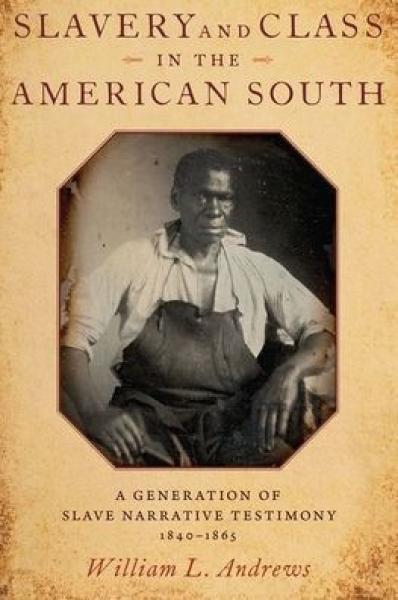Description
fugitive slave, editor, and antislavery activist, stated this in his Narrative of the Life and Adventures of Henry Bibb (1849). In William L. Andrews's magisterial study of an entire generation of slave narrators, more than 60 mid-nineteenth-century narratives reveal how work, family, skills, and
connections made for social and economic differences among the enslaved of the South. Slave narrators disclosed class-based reasons for violence that broke out between "impudent," "gentleman," and "lady" slaves and their resentful "mean masters." Andrews's far-reaching book shows that status and
class played key roles in the self- and social awareness and in the processes of liberation portrayed in the narratives of the most celebrated fugitives from U.S. slavery, such as Frederick Douglass, Harriet Jacobs, William Wells Brown, and William and Ellen Craft.
Slavery and Class in the American South explains why social and economic distinctions developed and how they functioned among the enslaved. Noting that the majority of the slave narrators came from the higher echelons of the enslaved, Andrews also pays close attention to the narratives that have
received the least notice from scholars, those from the most exploited class, the "field hands." By examining the lives of the most and least acclaimed heroes and heroines of the slave narrative, Andrews shows how the dividing edge of social class cut two ways, sometimes separating upper and lower
strata of slaves to their enslavers' advantage, but at other times fueling pride, aspiration, and a sense of just deserts among some of the enslaved that could be satisfied by nothing less than complete freedom.
The culmination of a career spent studying African American literature, this comprehensive study of the antebellum slave narrative offers a ground-breaking consideration of a unique genre of American literature.
"Though most slave narratives reflect the experiences of skilled ex-slaves, Andrews's work highlights field slaves' narratives and their experiences to give a more complete picture of the enslaved antebellum experience. An in-depth study of former slaves� concepts of class, this work is a valuable
resource to scholars of American history and literature." -- Choice
"In this crowning scholarly achievement of a long career, William L. Andrews confirms that these seemingly simple [slave] narratives can offer more complex and nuanced readings. In addition to revealing the value of close attention to the narratives, this monograph, as did Andrews's previous work,
highlights the complexity of the lives of the enslaved and their commentary on key issues." -- Nicole N. Aljoe, Journal of American History
"William Andrews has 'lifted the veil' on class relations within the slave community in the antebellum South. Well-meaning scholars, mostly for political reasons, have far too often chosen to remain silent about distinctions of class drawn by black people among themselves, starting in slavery,
choosing to discuss African Americans as if they were always a social monolith, and thereby reducing their complexity. Andrews reveals, in riveting detail, that this has never been the case, even well before the Civil War. This is a seminal work of scholarship, one destined to generate a new
branch of literary studies, dedicated to studying how class mattered within the African American tradition."--Henry Louis Gates Jr., Harvard University
"William Andrews has given us an inestimable gift-the first sustained consideration of the totality of known antebellum slave narratives. Andrews provides new insight into the ways enslaved and oppressed people leveraged limited social and economic power to claw out a place for themselves in a
system that was never meant to support their survival or success. This momentous work reveals more than we ever have known about the kinds of work these writers did before they made their way to 'freedom.' This much-needed contribution will be used by literary scholars and historians and will help
shape emerging scholarship for decades."--P. Gabrielle Foreman, Founding Faculty Director, The Colored Conventions Project
"No one knows the substance and range of slave narratives as well as William Andrews. The preeminent scholar of this genre here shows with brilliant clarity and new insights how much social class shaped the authors' lives within slavery, as well as motivated their desires and methods of achieving
freedom. Slavery and Class in the American South removes slave narrative authors from a flattened, mythic realm and probes their economic and social hierarchies. This is the most innovative book ever written on the first generation of African American writers."--David W. Blight, author of
Frederick Douglass: Prophet of Freedom
"Andrews's deep familiarity with the narratives that enslaved and formerly enslaved people produced in the mid-nineteenth century enables him to conduct a nuanced interrogation of how enslaved people perceived social class and privilege in the wider society, but particularly within their own
communities."--Heather Williams, University of Pennsylvania
"William Andrews is one of the leading scholars of American slavery and certainly one of our great authorities on the testimony of enslaved people. But here he has broken new ground by looking at how the enslaved understood and expressed social distinctions among themselves, notions of 'class'
within their own communities. Slavery and Class in the American South is a thought-provoking and unsettling read, though one that is important to grapple with."--Steven Hahn, author of A Nation Under Our Feet
Product Details
- Oxford University Press, Brand
- Oct 1, 2020 Pub Date:
- 0197547311 ISBN-10:
- 9780197547311 ISBN-13:
- 408 Pages
- 9.1 in * 6.1 in * 1 in Dimensions:
- 1 lb Weight:




